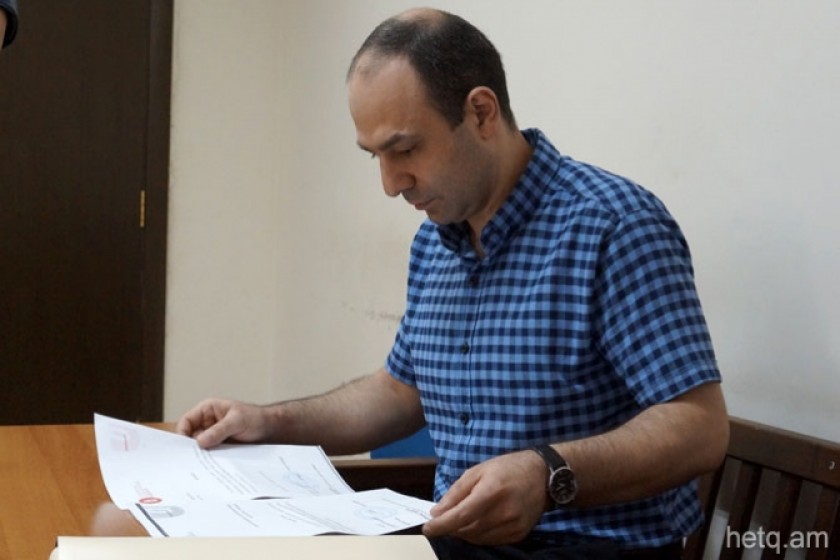
Achieving Justice: Those Who Struggle, and Those Who Conform
By Mher Yenokyan, Hetq Correspondent at Nubarashen Prison
Dear readers, known and unknown friends, I’m thankful that we can converse here and in this format.
They send me all your replies to my writings. Thanks for the congratulations regarding my three court victories, and thanks for the wishes that, God willing, the day of my physical liberation will soon arrive.
Don’t be surprised but, despite the injustices of 21 years, I believe that positive change will happen. Of course, such change isn’t just given.
Today, I want to talk to you about the defense of individual rights. There are two perspectives on this. The first argues that struggle is necessary; that the individual is a factor. The second claims that struggle is senseless, and that everything is decided without any input from you.
I am of the belief that the higher the level of a society’s intellect, especially familiarity about the law and the mechanisms to defend human rights, the faster that society can achieve positive and comprehensive change. Let me substantiate my belief by bringing examples of citizens who’ve wound up in prison.
For the past 22 years, I have seen that prison officials prefer that inmates not be knowledgeable about their rights and the legal avenues existing to defend their rights and protest illegalities. This is because when an imprisoned citizen starts to struggle knowledgeably, as a rule, that person stubbornly achieves victory.
Now, imagine for a moment, that a majority of imprisoned citizens demand, from prison officials, that their rights be implemented. Imagine that they start filing appeals, taking their cases through the court system and prosecuting their arguments effectively and rationally. Judges, in the end, would have no other choice but to apply the laws that exist.
I believe that, historically, the most effective way to persecute a people has been to keep them ignorant, most notably about the law. Rulers have sought to keep people uninformed, otherwise citizens would realize that it is up to them to achieve their rights and to make sure they are enforced.
Perhaps, I’m naïve in believing that by raising the level of legal awareness and by stubborn struggle certain progress can be achieved. Perhaps…but I believe it to be true and I’ve applied the principal for the past 22 years.
There’s another viewpoint, more widely held, that using the law and demanding the defense of rights is simply a dead-end, a sham, since almost everything is controlled by a handful of rulers and that, in this equation, citizens are powerless and that the “powerful” are the decision makers.
Those who believe this say that it’s possible that the rulers can make small concessions now and then, creating the illusion that there is hope that citizens can achieve justice and effect change. But a person who’s wound up on the legal circuit must spend time and money in the hope that all will be fine one day…But when death comes, it’s too late, for an individual or a people, since we will not have reached the main objective.
If I were to transfer the logic of the followers of this approach from a societal level to a personal one, then I come up with the following scenario. Regarding my visitation rights with family, the court followed the law and justice was achieved. But this was the limit of that justice. I mustn’t expect more.
For example, I should not expect a voiding of the death penalty sentence in the main case, or a reopening of the criminal case…To be honest, I realize that the visitation issue should never have reached the courts, with all the associated time, stress and wrangling. The system artificially created all of this to waste my time and to inspire me into believing that the citizen, perhaps, is a player; a change maker. Perhaps, those who support this viewpoint are also correct.
But I remain loyal to the first group – to struggle with hope, to self-educate, to hone one’s legal knowledge. My own example shows that despite closed doors and more than two decades of imprisonment, one must not tire and give up, thinking that everything is predetermined.
Perhaps, my 21 years of struggle will be soon rewarded with the victory of justice. Perhaps, independent and upright judges will sit on the Cassation Court, who will nullify the illegal and unjust 1996 court decision sentencing me to death.
I would like to see the theory of informed struggle take hold and practiced, and for justice to be restored for all of Armenia’s citizens.
(Mher Yenokyan, serving a life sentence, has been imprisoned for the past 21 years)
 Videos
Videos Photos
Photos




Write a comment